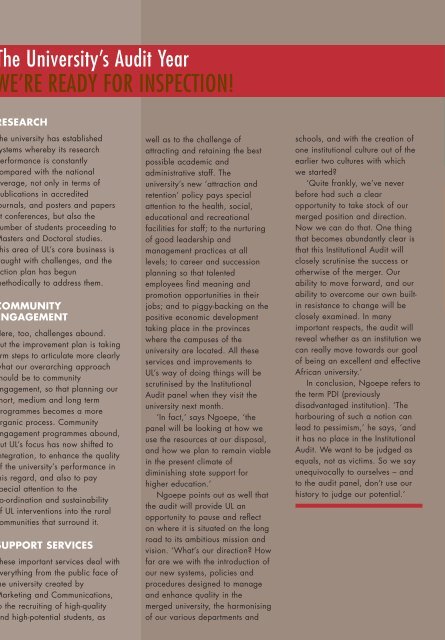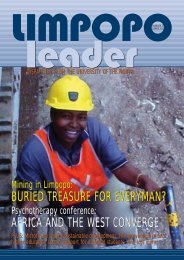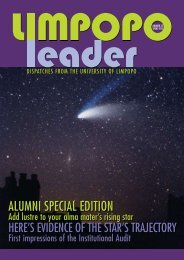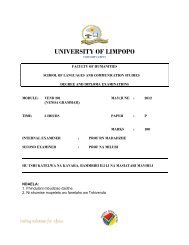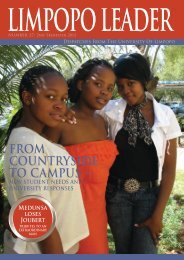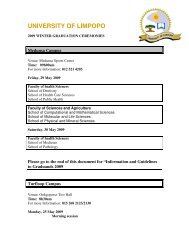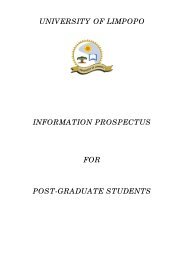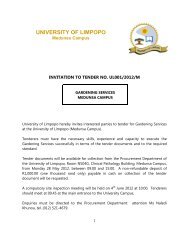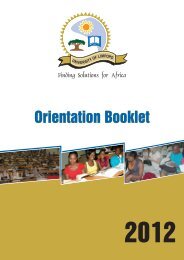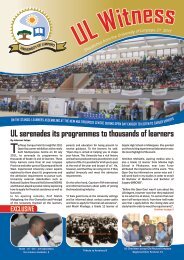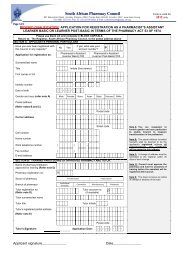MEDUNSA UPGRADE - University of Limpopo
MEDUNSA UPGRADE - University of Limpopo
MEDUNSA UPGRADE - University of Limpopo
Create successful ePaper yourself
Turn your PDF publications into a flip-book with our unique Google optimized e-Paper software.
The <strong>University</strong>’s Audit Year<br />
WE’RE READY FOR INSPECTION!<br />
RESEARCH<br />
The university has established<br />
systems whereby its research<br />
performance is constantly<br />
compared with the national<br />
average, not only in terms <strong>of</strong><br />
publications in accredited<br />
journals, and posters and papers<br />
at conferences, but also the<br />
number <strong>of</strong> students proceeding to<br />
Masters and Doctoral studies.<br />
This area <strong>of</strong> UL’s core business is<br />
fraught with challenges, and the<br />
action plan has begun<br />
methodically to address them.<br />
COMMUNITY<br />
ENGAGEMENT<br />
Here, too, challenges abound.<br />
But the improvement plan is taking<br />
firm steps to articulate more clearly<br />
what our overarching approach<br />
should be to community<br />
engagement, so that planning our<br />
short, medium and long term<br />
programmes becomes a more<br />
organic process. Community<br />
engagement programmes abound,<br />
but UL’s focus has now shifted to<br />
integration, to enhance the quality<br />
<strong>of</strong> the university’s performance in<br />
this regard, and also to pay<br />
special attention to the<br />
co-ordination and sustainability<br />
<strong>of</strong> UL interventions into the rural<br />
communities that surround it.<br />
SUPPORT SERVICES<br />
These important services deal with<br />
everything from the public face <strong>of</strong><br />
the university created by<br />
Marketing and Communications,<br />
to the recruiting <strong>of</strong> high-quality<br />
and high-potential students, as<br />
P A G E 6<br />
well as to the challenge <strong>of</strong><br />
attracting and retaining the best<br />
possible academic and<br />
administrative staff. The<br />
university’s new ‘attraction and<br />
retention’ policy pays special<br />
attention to the health, social,<br />
educational and recreational<br />
facilities for staff; to the nurturing<br />
<strong>of</strong> good leadership and<br />
management practices at all<br />
levels; to career and succession<br />
planning so that talented<br />
employees find meaning and<br />
promotion opportunities in their<br />
jobs; and to piggy-backing on the<br />
positive economic development<br />
taking place in the provinces<br />
where the campuses <strong>of</strong> the<br />
university are located. All these<br />
services and improvements to<br />
UL’s way <strong>of</strong> doing things will be<br />
scrutinised by the Institutional<br />
Audit panel when they visit the<br />
university next month.<br />
‘In fact,’ says Ngoepe, ‘the<br />
panel will be looking at how we<br />
use the resources at our disposal,<br />
and how we plan to remain viable<br />
in the present climate <strong>of</strong><br />
diminishing state support for<br />
higher education.’<br />
Ngoepe points out as well that<br />
the audit will provide UL an<br />
opportunity to pause and reflect<br />
on where it is situated on the long<br />
road to its ambitious mission and<br />
vision. ‘What’s our direction? How<br />
far are we with the introduction <strong>of</strong><br />
our new systems, policies and<br />
procedures designed to manage<br />
and enhance quality in the<br />
merged university, the harmonising<br />
<strong>of</strong> our various departments and<br />
schools, and with the creation <strong>of</strong><br />
one institutional culture out <strong>of</strong> the<br />
earlier two cultures with which<br />
we started?<br />
‘Quite frankly, we’ve never<br />
before had such a clear<br />
opportunity to take stock <strong>of</strong> our<br />
merged position and direction.<br />
Now we can do that. One thing<br />
that becomes abundantly clear is<br />
that this Institutional Audit will<br />
closely scrutinise the success or<br />
otherwise <strong>of</strong> the merger. Our<br />
ability to move forward, and our<br />
ability to overcome our own builtin<br />
resistance to change will be<br />
closely examined. In many<br />
important respects, the audit will<br />
reveal whether as an institution we<br />
can really move towards our goal<br />
<strong>of</strong> being an excellent and effective<br />
African university.’<br />
In conclusion, Ngoepe refers to<br />
the term PDI (previously<br />
disadvantaged institution). ‘The<br />
harbouring <strong>of</strong> such a notion can<br />
lead to pessimism,’ he says, ‘and<br />
it has no place in the Institutional<br />
Audit. We want to be judged as<br />
equals, not as victims. So we say<br />
unequivocally to ourselves – and<br />
to the audit panel, don’t use our<br />
history to judge our potential.‘


